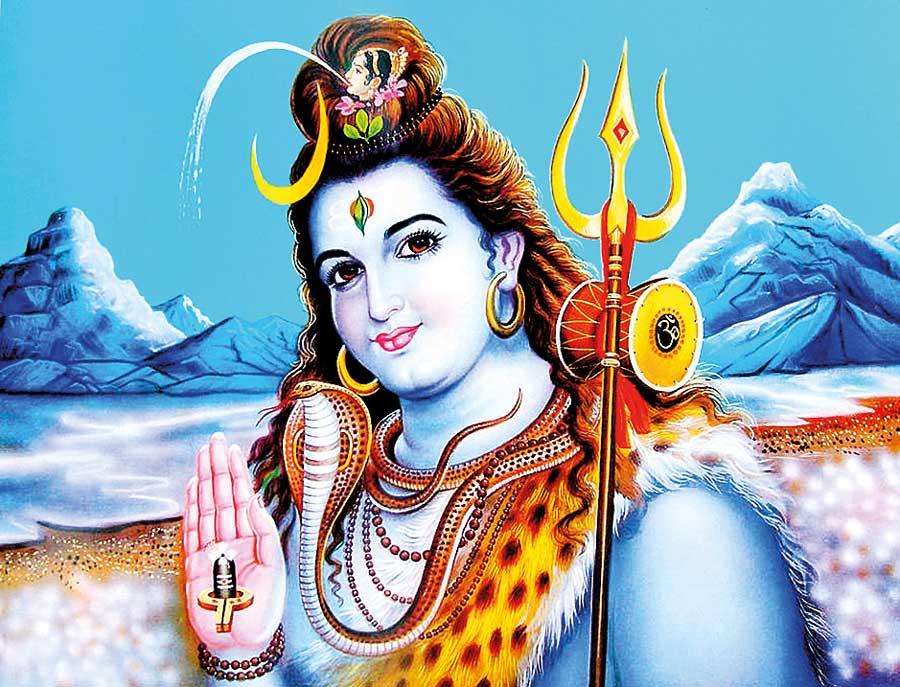08 Mar 2024 - {{hitsCtrl.values.hits}}

MahaShivaratri symbolises a profound “journey of spiritual awakening and inner transformation
“Maha” means most significant. “Shiva” means Lord Shiva and “Ratri” means night. “MahaShivaratri” is a spiritual and religious festival celebrated fervently and with enthusiasm by the Hindu devotees world over.The religious festival is significant as a day for meditation, restraint, taking spiritual refuge in Lord Shiva, transcending ignorance and overcoming inner darkness in life and the world.
with enthusiasm by the Hindu devotees world over.The religious festival is significant as a day for meditation, restraint, taking spiritual refuge in Lord Shiva, transcending ignorance and overcoming inner darkness in life and the world.
Who is Lord Shiva?
Lord Shiva, the supreme Lord of boundless consciousness and the ultimate source of cosmic balance, epitomises meditation and harmony.
He is depicted as the husband of Goddess Parvati Devi and the father of Lord Ganesha and Lord Skanda (Muruga).
The synonyms of Lord Shiva are benevolence, truth and beauty and the three are inseparable.
Significance and history of MahaShivaratri
Among the divine nights in the spirituality, MahaShivaratri holds a paramount significance for Lord Shiva. Although Sivaratri occurs monthly in accordance with the Hindu calendar, the one falling in the month of “Masi”(mid February to mid March), is known as, “MahaShivaratri “ and is revered as the most auspicious night for the three-eyed deity, Lord Shiva.
There are many stories around the significance of MahaShivaratri. This night is widely believed to mark the divine union of the three-eyed Lord Shiva with Goddess Parvati. Popularly, it relates to the Lord Shiva’s “Tandav”, His cosmic dance embodying creation, preservation and dissolution.
Some purana say that MahaShivaratri is a day to wash away people’s sins, apologise, clean up and get close to God.
Some people call MahaShivaratri, “the night of stillness”. They believe that after millions and millions of years of meditation, Lord Shiva became still and this day is MahaShivaratri.
Another tale recounts Lord Shiva’s valiant act of consuming “Halahala”, the poison that emerged during the churning of the cosmic ocean. Goddess Parvati, in a bid to protect Him, clasped His throat, turning it blue and earning Him the epithet “Neelakanth”.
Observance during MahaShivaratri
MahaShivaratri celebrations are marked by the observance of strict day-night fasts and staying awake throughout the night.
Fasting is the practice of abstaining from eating or drinking anything for a specified period. The Hindu religion has always advocated fasting and in recent times, many experts are encouraging people to fast, thanks to the benefits fasting brings.
“MahaShivaratri fast”, is also called MahaShivaratri Vrat (Viradham). This is a practice of fasting for 24 hours, from morning of the festival until the next day.
Puranas say that observing the fast on the night of Shivaratri would bring devotees “bhukti” or prosperity on earth as well as “mukti” or salvation.
It is believed that the punya or good fortune acquired from worshipping the Shivlinga (Shivalingam) with Bilva (Vilva) leaves and Abhisheka (Abhishekam) (ritualistic purification of the deity) is profound as 10,000 Ganga Snana (Ganga Snanam) (baths in the Holy River Ganga). The day-night fasts of Shivaratri are said to be equivalent to performing 100 yagnas (Vedic Sacrifices).
Lord Shiva, renowned as “Abhishek Priya”, the One who adores Abhisheka, is worshipped with Abhisheka (Abhishekam).
Devotees, both in temples and homes, honour Him by anointing the Shivlinga (Shivalingam) with offerings such as milk, curd, Vibhuti, tender coconut, ghee, panchamrita, honey, sandal paste, sugarcane juice, water and Vilva leaves, in a ritual known as “Rudra Abhisheka”. Mantras resonate through the air during these offerings, infusing the atmosphere with spiritual energy.
Despite His grandeur, Lord Shiva is said to be content with even the humblest offerings such as milk or sweet potatoes, reflecting His benevolence and approachability.
MahaShivaratri symbolises a profound “journey of spiritual awakening and inner transformation”.
As devotees unite in prayers and meditation, not only do they seek and invoke Lord Shiva’s blessings but also seek a deeper connection with the limitless consciousness that He epitomises.
MahaShivaratri serves as a timeless reminder of the eternal cycle of creation, preservation and dissolution, mirrored in the rhythms of our own lives.
My message on this holy day is, “In life, be grateful for everything you have. In gratitude, the mind expands, trust becomes more concrete and Lord Shiva, the Supreme Consciousness directs and facilitates the achievement of higher goals. Hence, always “Be Gratuitous”.
“May Almighty Lord Shiva bless you, your family, work, our Motherland and the Universe”.
(The writer is a senior advisor, senior lecturer and teacher trainer of Sri Ponnambalawaneswarar Hindu Religious School).
01 Jan 2025 54 minute ago
01 Jan 2025 1 hours ago
01 Jan 2025 2 hours ago
01 Jan 2025 3 hours ago
01 Jan 2025 4 hours ago